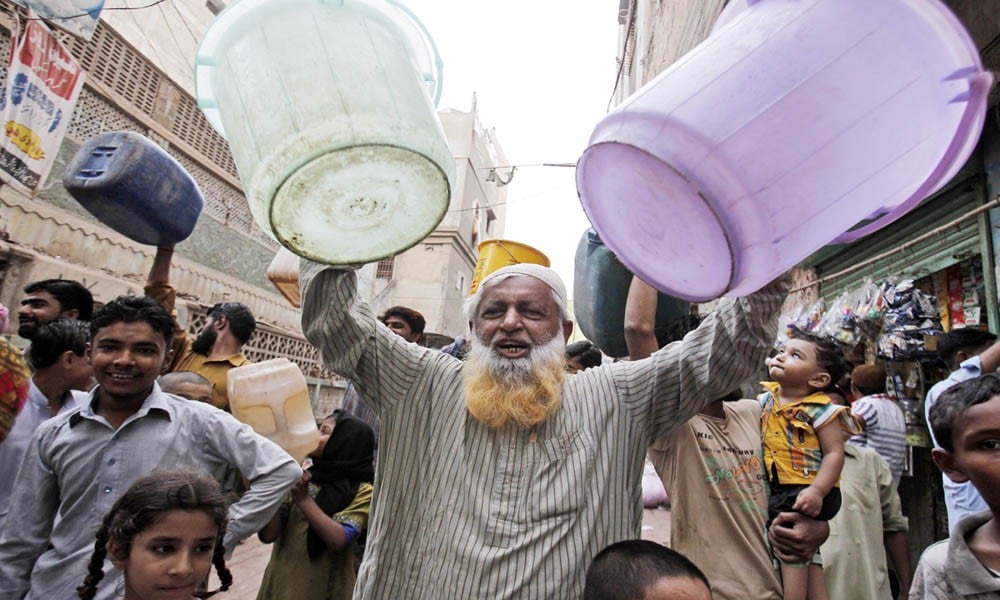
The new local government system should be put in place at the earliest to bring peace and harmony

And the expected has happened. The election authorities postponed the elections of mayors, deputy mayors and other officers on June 14, 2016. The reason given for this inopportune move is that the terms of the members of the Election Commission of Pakistan have been completed. This constitutional process to name new members, which involves parleys between the prime minister and opposition leader, will certainly take some time.
Meanwhile, the management of cities, especially those in Sindh, continues to suffer. On June 5, 2016, the leadership and workers of the Muttahida Qaumi Movement (MQM) protested in front of Karachi Press Club and the Chief Minister’s House demanding immediate reform in the city’s water supply. MQM’s party workers only dispersed after the leadership of Sindh’s provincial government announced that speedy measures would be taken to meet their demands.
Another problem arose due to the recent transfer of Karachi’s commissioner. The major political forces in Sindh and the relevant quarters of establishment need to evolve a permanent political equation to manage the cities and towns in the province on a sustainable basis.
It is sad to note that while the federal and provincial governments tend to collaborate, the local tiers are left out. This dissension is further spread by the henchmen who control provincial tiers of respective parties.
It is correct that the local government systems have been bolstered by military dictators for their own vested interests but this does not undermine the merits and opportunities built into it. Foremost in this respect is the creation of a legitimate avenue for leadership development. In an arena where dynastic and aristocratic claims to leadership tend to overtake merit, the only option which can enable future political leadership to emerge is local government.
There are hundreds of case studies pertaining to ordinary councilors, women/labour councilors, union council nazims, town/tehsil/taluka level leaders and district level representatives who were able to win their offices purely on merit and later proved their popularity through re-election. Even in the most dangerous areas of the province, these dedicated public representatives made tireless efforts to address dire problems related to education, health, social welfare and area management. Some of them were even devoid of any political affiliation and had to face the wrath of both right-and left-wing parties.
The three elections during 2001, 2005 and 2015 were reasonable tests for their performance evaluation, mal-functioning of electoral process notwithstanding. Real political culture cannot be nurtured without frequent practice of voting process along the party cadres, local, provincial and national assemblies. These roots of democracy can only germinate if allowed to do so at the lowest level of governance.
If one examines the level of access between citizens and local councilors and other representatives, it constitutes the baseline of political interactions. Citizens need an efficient service delivery mechanism and complaint redress system for routine matters such as attestation, verification and certification of various kinds. Local institutions and their elected members are normally forthcoming in such tasks. Small scale development schemes, maintenance and repair projects also require immediate attention.
If the decision making apparatus is centralised in Karachi, with the chief minister in charge, very little progress can be expected. To expect bureaucrats to be sympathetic towards local issues is unrealistic. A well-functioning local government system in urban and rural domains has to be strengthened after removing the various handicaps that it has faced. Problems identified during the past eight years include poor quality of human resource, paucity of operational budgets, weak mechanism of monitoring, absence of effective audit and accounts procedures, financial dependence on the provincial/federal government, lack of control over police force, tutelage exercised by federal/provincial institutions and inability to generate development finance for local scale works.
One finds more developed cities like Karachi struggling with shortage of funds to strengthen vital services such as water supply. Many other contexts are even worse in service delivery outreaches.
It is interesting to observe that most of the developed and progressive countries across the world have strong local governments. In the United Kingdom, there is a reasonably strong system of local government divided in a synchronised hierarchy of regions, boroughs, unitary authorities and metropolitan and non-metropolitan counties. The United States, which has a federal structure, possesses capable local governments at the county, town and municipal level. They have sufficient functional and financial autonomy to manage local affairs.
The 73rd and 74th Constitutional Amendments gave sufficient working autonomy to local units of Indian local governments to deliver day-to-day services to local residents. While the quality of service delivery may vary from place to place in this large country, the administrative structure has been in place for quite some time.
Pakistan’s Article 140-A lays down the foundation of a proper local government, unfortunately, it is still waiting for effective implementation by the provincial executive structure.
Regimes may evolve a fresh strategy by using elected local governments to serve their manifestoes. Capacity-building in the local service delivery; notification and enaction of bodies such as public safety commissions, citizen community boards or finance commissions; development of municipal services as specialised cadres; launch of appropriate taxes to generate local revenue and the acceleration of mass contact to stretch the outreach of this tier are some basic steps.
There are various institutional arms, think-tanks and nongovernmental organisations that have garnered enough experience to transform the political objectives into a proper workable blueprint for the local government. In the spirit of democracy and fair play, any such blueprint should be debated threadbare with each stakeholder, party and group that has a stake in Sindh.
The new local government should bring peace and harmony to the province, not generate further schisms in the already divided ranks in the society.